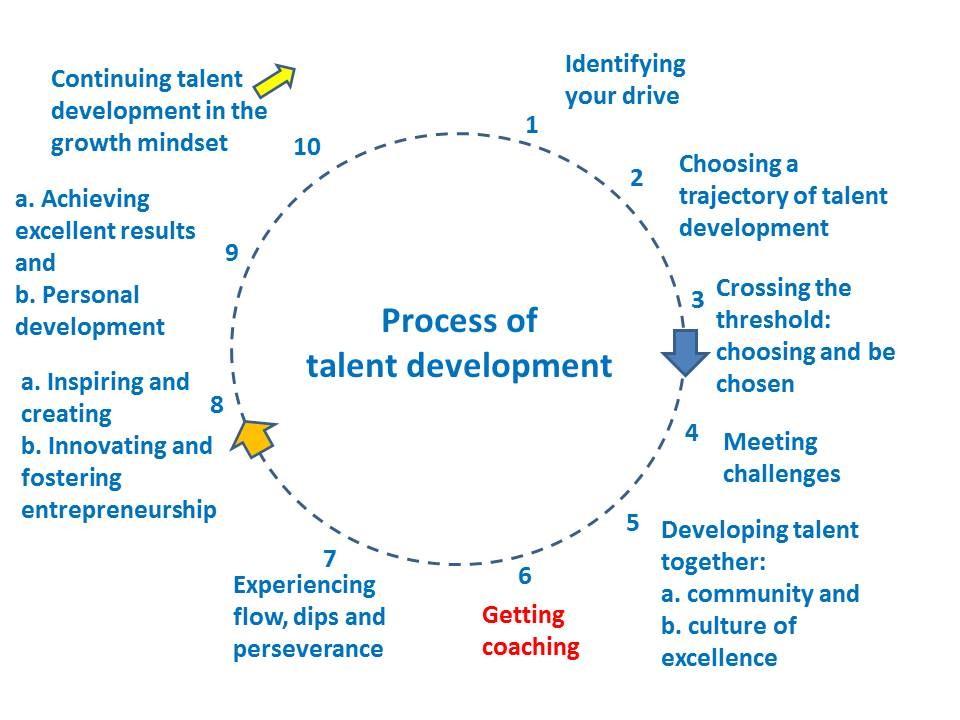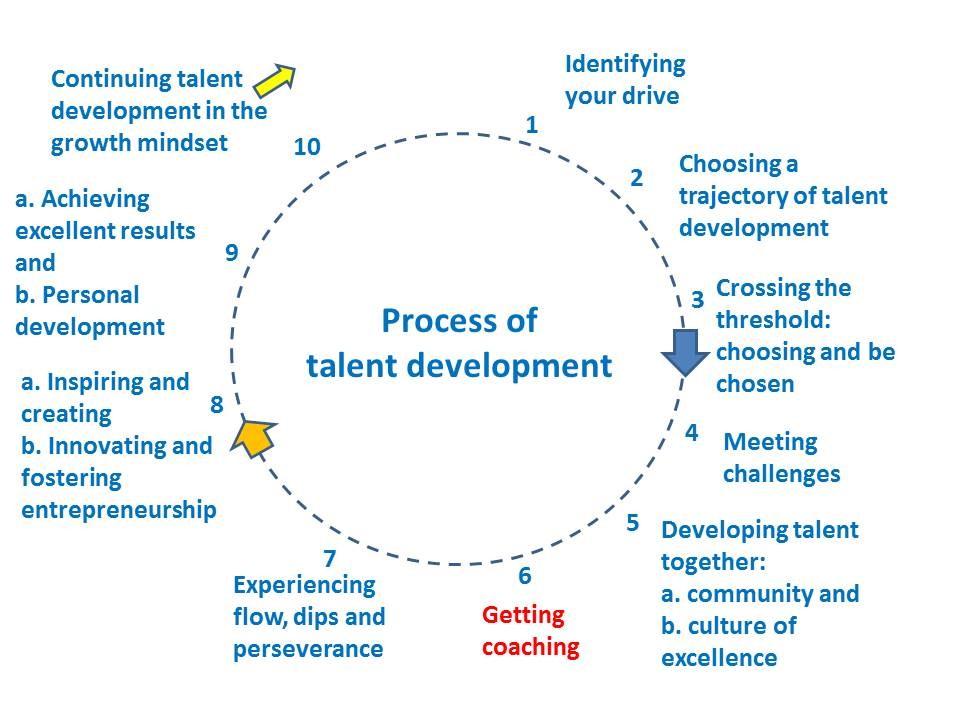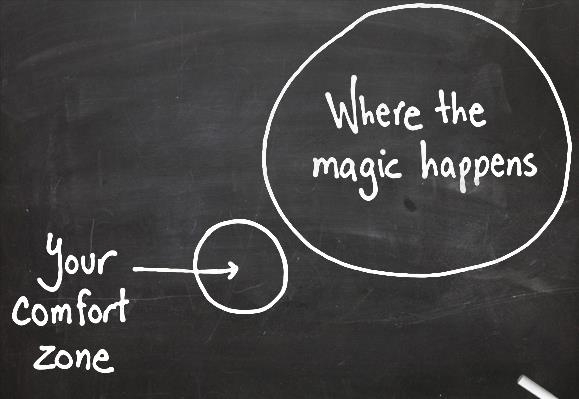Pierre van Eijl, Albert Pilot (Utrecht University, The Netherlands) and Milou van Dommelen (HvA Amsterdam University of Applied Sciences, The Netherlands). Contact: Pierre van Eijl (eijl0000@wxs.nl)
Coaching can make the difference in a process of talent development
In a research project (Van Eijl & Pilot, 2016) forty honours students from six different universities in the Netherlands were interviewed about the development of their talents in honours programmes. It turned out that they experience that a lot of activities in their honours programmes are important to develop their talents; coaching was a very important factor in their opinion. For clarity, we have arranged these activities in ten steps in the "circle of talent development” (see Figure 1), which was inspired by "The hero's journey", of Joseph Campbell (1949).

Figure 1: Coaching in the Circle of talent Development
Coaching, activity 6 in figure 1, can make the difference in talent development. As one student put it: "There was a lot of interaction with my coach. She saw that we were enthusiastic and gave constructive criticism. We were not told what to do, but ideas came from two sides. Not everything was decided in advance."
Helping to become on track
So, the coach/teacher can help a student to become on track and ensure that his or her talent development is really successful. An honours student tells how she experienced the coaching:
"The coaches did not say what to do, but they encouraged us to make our own decisions and develop ourselves. We were always able to contact the coaches. Because I got this freedom, I started to work in a more focused manner. The coaches of the honours programme stimulated me to be critical, they challenged me to go one step further so that I could get the most out of the programme and myself. But the moment it became too much, and I even thought about quitting the program, there was room to discuss that. The coaches then gave me the space to take a step back and made sure that it was always negotiable ".
In an honours programme also fellow students from the team or honours community (Van Eijl, Pilot & Van Ginkel, 2017) who can fulfill the function of coach, next to the teacher/coach.
Not an unnecessary luxury
Coaching is a necessary luxury in talent development in honours programs and other programs in which a student gets a lot of freedom. On the one hand the student has more freedom in honours than in the regular programme and thus more possibilities for a personal contribution, on the other hand the chance is also greater to get stuck, to fall into a dip or to be inefficient. These can lead to delay and withdrawal. A coach that guides a student without controlling too much, is then important. It appeared in many interviews that the students appreciate the direct contact with the coach. This function of a teacher is characteristic for talent development in honours and other programs with a lot of freedom. A function for which fellow students in the honours community and external practitioners are also important.
Topics in this article
The experiences of students with coaching as expressed in the interviews, has been grouped in the following topics:
● The zone of proximal development and the coach
● Coaching seen through the eyes of the student:
- Involvement, feedback and a listening ear
-Prescribing or helping on their way?
-Attention to personal development
-The bar is set high
-Coaching by external supervisors
● Key points of getting coaching
The zone of proximal development and the coach
A student who participates in an honours programme will face many challenges. The student receives many open assignments, gets plenty of room for personal contributions and has also 'real' projects in which external parties are involved. At the same time, a student must collaborate with other honours students from sometimes very different programs. This is precisely why a student can develop his talents, but it is also entering unknown territory which takes time and effort to get acquainted and can cause unforeseen problems. The guidance by the coach/teacher and feedback from fellow students is important for students to further develop in their so-called 'zone of proximal development' (Vygotsky, 1978) (see arrows in figure 2).

Figure 2: Coaching and the zone of proximal development
The inner circle in figure 2 (zone 1) reflects the area in which the student can find his own way and needs little or no supervision, this is familiar territory, the comfort zone.
The middle zone (2) concerns the new challenges that the student encounters in his study and where he can become trapped. This is the 'zone of proximal development'. This zone is not only about cognitive but also affective challenges. These challenges may concern activities in which the student is stuck by a problem or situation and does not know how to proceed with it. The challenge may also involve underestimating a project and its consequences. Also the cooperation with others and taking initiative, can be quite a challenge in terms of communication and emotions.
A student talks about the process of entering the zone of proximal development as an ever expanding comfort zone: "The honours programme has encouraged me to step out of my comfort zone and to find the magical moments that can be found outside of it (see figure 3). This has caused a chain reaction in myself; I trigger myself to step outside my ever-expanding comfort zone as much as possible, even though certain things give me some fear. These fears are in reality usually illusions."

Figure 3: Step out of the comfort zone
Coaching can come from a teacher/coach but also from fellow students. A student explains: "You stimulate each other through the stories you tell. You also get to know each other better through the group activities. Helping each other is motivating."
The outer zone (3) is the area of study that students are not ready for and where they can easily be asked for more than they can do. These three zones are dynamic, because every time a student has learned something new, the zones change and the student becomes ready for the next challenge. This can be a more complex challenge or a challenge in another area.
Student’s view on coaching
The interviews showed that many students consider the coach's involvement, feedback and having a listening ear as very important. They have a clear preference for a coach who helps them on their way and does not prescribe them but encourages them and pays attention to personal development, but also sets limits on specific points (e.g. time, quality of results).
Involvement, feedback and seriously listening
Nearly all interviewed students have had coaching in their program, but the precise form differs depending on the program, the coach and the student. Sometimes it is one coach and sometimes there are two. Important aspects that students mention are experiencing involvement of the coach and that the coach gives feedback but also is listening seriously.
The coach can also be the tutor of a working group. A student says: "I had with the coach regular individual interviews. During these interviews all kind of things could de discussed: your progress, what you did or did not like about the program, what you would do in the coming period and so on". The student was especially pleased that the atmosphere during these conversations was quite informal: she felt free to say what she wanted. In addition, she liked that she could come along her tutor's room if she had a short question where she wanted to talk about. Another student said it was of crucial importance to him that the coaches offered a listening ear. In one of the programs, there was not a clear coach, but every teacher who worked on the programme was always available for coaching students. The students could always contact them if they needed help: "In that way I could go to everyone with a certain expertise, such as the lecturer 'social innovation' or the lecturer who knew a lot about team building. It was nice to get feedback, which was always very rich and where we could do a lot with as an individual or as a team". A student says that the coaches were very important to her, but she also looked up to them all the time in the programme because she felt, she had to prove herself to them.
Would you rather be prescribed or helped on your way?
Four important points emerge from the interviews about whether students prefer to be prescribed how to work or whether they prefer to be guided on the road: getting started, encouraging them to take initiative, paying attention to personal development and prescribing only on specific points.
Getting started
The general tendency in the students' experiences was that the coach was there to help them self-regulate their projects and their personal development and to answer their questions, An honours student describes this on the basis of her experiences: "In the first year we had two coaches, we saw at least one of the two every week during the workshops. The coaches were really involved and thought along with us, we liked that very much. We got along with our coach in a very different way than for example in the regular program, where you really have a teacher-student relationship, but here you were more a study group or a think tank. The coach challenged you to think or participate in a different way or to focus on something. There were also individual moments which were quite informal. You could always call on your coach if you wanted to." When this student went to a conference in America, one of the coaches was very supportive for her. The coach prepared her for the conference so she knew what she could expect. Th coach not only provided information but also asked questions to make her think.
A student emphasizes the guiding role of the coach and also the fact that they had to do it themselves: "The coach also guides the group in doing research and was focused on helping to get started, but nothing in it was prescriptive. We had to do it all ourselves, but he could give a little push in the right direction so that we could continue”. A student indicates that she had guidance on demand: "remotely but not distant. If you had questions you could make an appointment or send an email. I had only two appointments, but it was good that there was a safety net if you had questions. I felt supported and that was enough". With the teachers of the program, she discussed her plan for obtaining her 'stars' for her honours certificate. In addition, her supervisor created extra opportunities for her, which she herself could not arrange or was not aware of. A student of an art programme said that it was important for him that students' ideas were taken seriously: "It was for me mainly helping when I was stuck. The supervision made us aware of possible pitfalls, paradigms and themes that we were not aware of ".
Sometimes honours students also have critical remarks about the regular program. An honours student indicates this as follows: "In the regular program, teachers actually assume that you cannot do it and that you have to prove that this is not the case. That is 'crooked', because everyone is good at something. This is different in the honours program. It is assumed that you are competent and you get the freedom to design the programme yourself". Keeping your focus, asking the right questions and giving you the space to develop your own development, is what he sought and found in the honours program. Another honours student emphasizes that " the attitude of the coaches is different from the regular program, it is more equal. The coaches getting motivated by the energy of the students and vice versa. They raise the bar and generate more challenges than one does in the regular program".
Attention for personal development
Students explicitly mention the importance of being coached for their personal development: "We were also listened to if we did not agree with something or if we wanted it differently or if we saw it differently. Then there was room to discuss that. You could always come along by your coach to talk about your development. You were also challenged to take a step further".
The bar is set high
Although the coaches mainly have a guiding and stimulating role in the process of talent development, students find it important to set requirements in the form of deadlines and criteria for the quality of products. A student says that it works well if the bar is set high and individual feedback is given. The students of an honours programme of social geography were given the freedom to choose their research topic, but there were also high expectations from the coaches about the results. An honours student did a research project together with another student: " It had to be good research and not something that was rattled off. As an honours student, you were taken more seriously by the staff at the university. You were expected to get the best out of yourself ".
Coaching of external supervisors
External coaches can play a role in the development of students' talents. This can be an external client, a guest lecturer, but also a (foreign) partner cooperating in a project. A student tells us that she worked together with a client from outside her institute: "I have benefited a lot from the cooperation with my external coach for my professional attitude, making appointments and communicating. I have learned how important it is to pose questions for clarification". Another student who has collaborated with various organizations in the healthcare sector, says " The most overarching is that I have come to realize that every situation is different. To make it a success, a great capacity for adjustment and empathy is a big advantage. This works positively when knowledge is shared or built up".
Key points of getting coaching
- Coaching is necessary so students can develop their potential.
- Students appreciate the direct contact with the coaches and that is important for developing their talents.
- Talent development requires students to get out of their comfort zone; this can be emotionally difficult and coaching is needed in this process
- The zone of proximal development is not only about content but also about personal development.
- If a student comes with questions and takes initiatives the coaching becomes more effective.
- For personal development trust between student and coach is needed.
- A coach can ask provocative questions that will stimulate students’ thinking and pushes them without giving a solution.
- If students help others with questions and tips, they learn also at the same time.
Campbell, J. (1949). The hero with a thousand faces. 1st edition, Bollingen Foundation, 1949. 2nd edition, Princeton University Press. 3rd edition, New World Library, 2008.
Coppoolse, R., Wolfensberger, M.V.C., Eijl, P.J. van, Hermsen, L., Berge, J. ten & Kinkhorst, G. (2013). Honours teaching. In: R. Coppoolse, P.J. van Eijl & A. Pilot (Red.), Hoogvliegers, ontwikkeling van professionele excellentie. [Highflyers, Development towards Professional Excellence] Rotterdam, The Netherlands: Rotterdam University Press, p. 127 - 146. Synopsis in English at: https://www.ris.uu.nl/admin/editor/dk/atira/pure/api/shared/model/base_uk/researchoutput/editor/contributiontoconferenceeditor.xhtml?id=21199699 Complete Dutch version: https://www.researchgate.net/publication/316991133_Hoogvliegers_ontwikkeling_naar_professionele_excellentie
Eijl, P.J. van & Pilot, A. (2016). The honours experience, talentontwikkeling door de ogen van de honoursstudent. Rotterdam, The Netherlands: Hogeschool Rotterdam Uitgeverij. Synopsis in English at: https://www.researchgate.net/profile/Pj_Eijl/contributions. Complete Dutch version: https://www.researchgate.net/publication/316456151_Promoting_talent_development_in_honours_The_Honours_Experience Eijl, P.J. van, Pilot, A. & Ginkel, S. O. van (2017). Developing talent together in an honours community. Website Student success: http://www.lde-studentsuccess.com/news/developing-talent-together-in-an-honours-community
Vygotsky, L.S. (1978, originally 1934). Mind and Society: The development of higher psychological processes. Cambridge, MA: Harvard University Press.
Illustration credits: see the book: Eijl, P.J. van, & Pilot, A. (2016) The Honours Experience, talentontwikkeling door de ogen van de honours student, Rotterdam, The Netherlands: Hogeschool Rotterdam Uitgeverij
